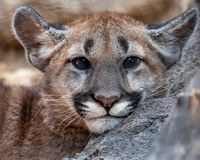Two New Mountain Lions at the Zoo
Rescue cub and adult now call Albuquerque home.
Dec. 4, 2019 - The ABQ BioPark recently welcomed two more feline faces: one adult and one juvenile mountain lion.
The male cub, "Larabee," arrived at the BioPark on October 24. Larabee was discovered in a backyard in Nebraska. The cub was originally found with its sibling, who later ran away and a deceased female mountain lion was later found and believed to be the cubs' mother. The homeowner was able to care for the remaining cub, which was dehydrated and weak, until Nebraska Game and Parks could rescue him.
Larabee, whose name comes from the street where his rescuer lived, was taken to the Omaha's Henry Doorly Zoo and Aquarium, where they temporarily cared for him for two more weeks before transferring him to Albuquerque. Larabee is currently acclimating to his new home on the Catwalk.
Larabee is not the ABQ BioPark's first rescue mountain lion cub. The Zoo has collaborated with a number of organizations over the years including Nebraska Game and Parks and New Mexico Department of Game and Fish to offer refuge to rescued mountain lions.
"Larabee is part of the BioPark's ongoing legacy of helping rescue mountain lion cubs," said Mammal Curator Erin Flynn. "We are pleased to welcome him to his new home and to contribute to the conservation of this New Mexico-native big cat in this way."
The ABQ BioPark welcomed a second mountain lion this fall as well; 10-year-old female Gillin. Gillin arrived from the Northeastern Wisconsin Zoo and Adventure Park on November 12 and was once a rescue cub herself in Oregon. Gillin will be on exhibit by the end of this week.
All mountain lions in Association of Zoos and Aquariums accredited facilities are rescues from the wild and the AZA does not have a breeding plan for the species. That is because there are so many mountain lions in need of rescue due to hunting and other human encroachment in mountain lion territory.
The mountain lion--also known as cougar, puma, panther and catamount--is native to the Americas from Canada south to Argentina. Cougar populations are on the decline, and hunting is prohibited across much of its range in Latin America and Canada as well as California. The US Fish and Wildlife Service has also listed one sub-species, the Florida panther, as endangered and protected by the Endangered Species Act.
MEDIA: A photo of Larabee, which should be attributed to the New Mexico BioPark Society, can be downloaded here: https://lightroom.adobe.com/shares/baa52127021b44789e7fc98deaf3159f

